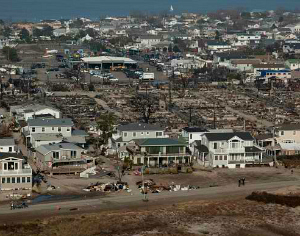When Superstorm Sandy battered the East Coast with high winds and a massive storm surge, 111 homes in the Queens, New York, neighborhood of Breezy Point were destroyed by a fast-spreading fire.
This week, the Consumer Federation of America (CFA), a consumer advocacy group, called on New York Gov. Andrew Cuomo, New York City Mayor Michael Bloomberg and the superintendent of the New York Department of Financial Services, Benjamin Lawsky, to take immediate action to prevent a little-known insurance clause from potentially resulting in denied claims.
The CFA asked regulators to make sure that claims for these and other homes harmed by fire, wind, and flood are paid promptly.

“Anti-concurrent-causation clauses (ACC) apply when a loss is caused by a combination of covered events, such as fire or wind, and non-covered events, such as a flood,” said J. Robert Hunter, director of insurance at the CFA.
“When a policy contains an ACC, insurance companies can deny an otherwise covered claim – like fire or wind – regardless of the sequence of events. They can also deny an otherwise covered claim even if both events are shown to have contributed to the loss at the same time,” said Hunter.
For example, if a homeowner has both a homeowner’s insurance and flood insurance policy, the coverage will likely be granted and the insurer will cover losses associated with fire or wind while the National Flood Insurance Program will cover losses associated with flooding.
However, if the homeowner has a homeowner’s insurance policy but not a flood insurance policy in force, an ACC could result in denied claims for fire and wind damage, as well as flood damage.
Approximately 70 percent of New Yorkers in flood zones do not have flood insurance in place, putting their claims – even their wind and fire claims – at risk, according to the statement from the CFA.
Hunter argued that after Hurricane Katrina, ACCs were used to deny numerous claims, prompting litigation that has not sufficiently clarified the circumstances under which ACCs can be enforced. In separate cases, courts ruled both ways; that ACCs were valid and could be used by insurance companies to void otherwise present coverage, and that ACCs were ambiguous and could not be enforced.
“We believe that additional clarity is needed and can be provided by the New York Department of Financial Services,” said Hunter. “We call on state regulators to take action to help New Yorkers whose fire and wind-related insurance claims payments are at risk of denial due to an unfair and legally unclear clause buried in the fine print.”
I.I.I.: ‘Hunter’s Assertion Has No Basis in Fact’
However, the Insurance Information Institute disputed Hunter’s allegation that ACC clauses might deny legitimate claims. “Mr. Hunter’s assertion has no basis in fact and CFA provides absolutely no substantiation to back up its statement,” I.I.I. President Robert Hartwig told Insurance Journal.
Hartwig said he’s aware of no problems in terms of the settlement and payment of the fire claims at Breezy Point. “In fact,” he said, “I am personally aware that some insurers have paid full policy limits on the homes that were destroyed by fire at Breezy Point.”
“The adjusting process has proceeded smoothly. All policyholders will receive the full and fair amount under the terms of the policy they purchased,” said Hartwig.
Topics Claims Flood New York Homeowners
Was this article valuable?
Here are more articles you may enjoy.


 Viewpoint: Runoff Specialists Have Evolved Into Key Strategic Partners for Insurers
Viewpoint: Runoff Specialists Have Evolved Into Key Strategic Partners for Insurers  AIG’s Zaffino: Outcomes From AI Use Went From ‘Aspirational’ to ‘Beyond Expectations’
AIG’s Zaffino: Outcomes From AI Use Went From ‘Aspirational’ to ‘Beyond Expectations’  Sompo Receives Regulatory Approvals to Acquire Aspen Insurance in $3.5B Deal
Sompo Receives Regulatory Approvals to Acquire Aspen Insurance in $3.5B Deal  Former Broker, Co-Defendant Sentenced to 20 Years in Fraudulent ACA Sign-Ups
Former Broker, Co-Defendant Sentenced to 20 Years in Fraudulent ACA Sign-Ups 

